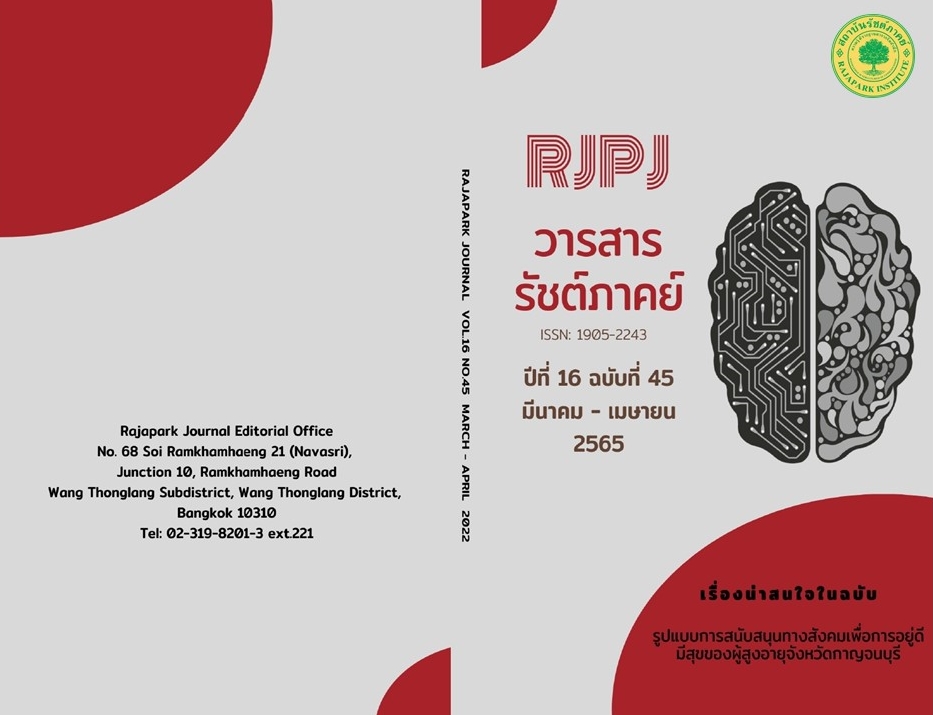Development of Curriculum based on STEAM2 for Enhancing the 4Cs Skills of Grade 7 Students
Main Article Content
Abstract
The purposes of this research were to 1) develop a curriculum based on STEAM2 for enhancing the 4Cs skills of grade 7 students; and 2) study the effectiveness of the curriculum based on STEAM2 for enhancing the 4Cs skills. The study group consisted of 26 students in grade 7 from Ongkarak Demonstration School Srinakharinwirot University by purposive sampling. The research tools were a semi-structured interview form, a developed curriculum based on STEAM2, a lesson plan, and a 4Cs evaluation form. Data were analyzed using mean, standard deviation, and content analysis. The findings revealed that: 1) the developed curriculum based on STEAM2 for enhancing the 4Cs skills was highly appropriation; and 2) the learning activities focusing on students’ connecting knowledge, process, and skills of various subjects in STEAM2 to use in creative thinking and problem solving could enhance learners’ 4Cs skills.
Article Details

This work is licensed under a Creative Commons Attribution-NonCommercial-NoDerivatives 4.0 International License.
Views and opinions appearing in the Journal it is the responsibility of the author of the article, and does not constitute the view and responsibility of the editorial team.
References
Conradty, C., Sotiriou, S.A., & Bogner, F.X. (2020). How Creativity in STEAM Modules Intervenes with Self-efficacy and Motivation. Education Sciences, 10(70), 1-15.
Guilford, J. P. (1967). The Nature of Human Intelligence. New York: McGraw-Hill.
Institute for the Promotion of Teaching Science and Technology. (2017). Manual for Basic Science Subject (Revised edition 2017) According to the Core Curriculum of Basic Education (2008) at the Primary Level. Retrieved 3 September 2020, from https://www.scimath.org/ebook-science/item/8922-2018-10-01-01-54-11
Khammani, T. (2020). Teaching Techniques: Knowledge for Effective Learning Process. Bangkok: Chulalongkorn University.
Kembara, M.D., Rozak, R.W.A., & Hadian, V.A. (2018). Research-based Lectures to Improve Students' 4C (Communication, Collaboration, Critical Thinking, and Creativity) Skills. Advances in Social Science, Education and Humanities Research, 306, 22-26.
Ministry of Education. (2017). Basic Education Core Curriculum B.E. 2551 (Revised A.D. 2017). Bangkok: Printing House Agricultural Cooperatives of Thailand Ltd.
National Education Association. (2019). An Educator’s Guide to the “Four Cs” Preparing 21st Century Students for a Global Society. Retrieved December 5, 2019, from http://www.nea.org/tools/52217.htm
National Research Council. (2012). A Framework for K–12 Science Education: Practices, Crosscutting Concept, and Core Ideas. Washington, D.C.: National Academy.
Patphol, M. (2019). Curriculum Development Approach. Retrieved January 10, 2020, from http://www.curriculumandlearning.com/index.php?page=Home&language=th
Science Education Center. (2021). STEM2 Curriculum. Retrieved March 22, 2021, from http://stem2.science.swu.ac.th/home.html
Sudjitjul, W., & Art-in, S. (2019). The Development of Supplementary Course on Creative Music Instrument for Lower Secondary School Students Using STEM Education. Journal of Education Graduate Studies Research, KKU., 13(2), 1-11.
Taveebot, P., Chanunan, S., & Klamtet, J. (2020). An Action Research on Enhancing Gifted Students’ Collaborative Problem Solving through using Creative Problem-solving Approach on Stoichiometry. Journal of Education Naresuan University, 22(1), 147-161.
Taosi, K., Kijkuakul, S., & Nakkuntod, M, (2020). The Problem-based Learning Approach to Develop Grade 10th Students’ Communication Skills and Group Working Skills in the Topic of Basic Chemicals for Organisms. Journal of Education Naresuan University, 22(2), 31-48.
Thuneberg, H.M., Salmi, H.S., & Bogner, F.X. (2018). How Creativity, Autonomy and Visual Reasoning Contribute to Cognitive Learning in a STEAM Hands-on Inquiry-based Math Module. Thinking Skills and Creativity, 29, 153-160.
Tyler, R. W. (1949). Basic Principles of Curriculum and Instruction. Chicago: The university of Chicago press.
Vasquez, J.A., Sneider, C., & Comer, M. (2013). STEM Lesson Essentials: Integrating Science, Technology, Engineering, and Mathematics. Portsmouth, NH: Heinemann.
Wongyai, W. (2012). Higher Education Curriculum Development. Bangkok: R & N Print.
Wongdaeng, M., & Hajihama, S. (2018). Perceptions of Project-based Learning on Promoting 21st Century Skills and Learning Motivation in a Thai EFL setting. Journal of Studies in the English Language, 13(2), 158-190.
Wongdaeng, S., Sethachan, P., & Singkrut, W. (2018). The Development of a Training Curriculum to Enhance the 21st Century Learning Skills for Teacher Student in Rattanakosin Rajabhat University. Social Sciences Research and Academic Journal, 13(37), 75-90.
Yawirart, P., Kijkuakul, S., & Nakkuntod, M. (2020). Developing Learning Management of Social Constructivist Integrated-technology to Promote Communication Skills for Collaboration in Topic of Population for Grade 12th Students. Journal of Education Naresuan University, 22(1), 162-174.


